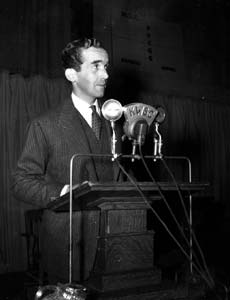
1960 – CBS airs Harvest of Shame, a show from Edward R. Murrow that described the working conditions of migrant laborers.
Although Murrow is more famous for his coverage of World War II from London and his television shows in the early 1950s exposing the Communist baiting of Wisconsin Sen. Edward McCarthy, a review of his program content showed that Murrow, the first great television journalist, also spent a considerable amount of time concerned with business and economic issues.
Murrow was born in Greensboro , N.C. , in 1908, but his parents moved across country to Washington state, and Murrow graduated from Washington State University in 1930. After a few years working in other jobs, Murrow joined CBS in 1935 and was sent to Europe to report on foreign news. Most of his work for the next 10 years focused on the impending war and then coverage of World War II. He began many of his radio reports with the trademark slogan, “This is London .”
While in England , however, Murrow also saw the importance of business. Upon returning to New York in September 1945 after the end of the war, Murrow remarked on the difference between the American economy and the European economy, noting, “The advertisements for new radios, cars, refrigerators, furniture, clothes, travel, frank – everything – speak a loud language of confidence.”
The 1950s were a time of economic expansion in the United States , and the media portrayed business as the driving force. Between 1950 and 1960, the gross national product of the country expanded 67% to $500 million. The composition of the workforce also changed, with white-collar workers outnumbering blue-collar workers for the first time in 1956. It was in these economic conditions that the mainstream media began to once again pay attention to crucial business issues, and although Murrow spent a lot of time in the early part of the decade reporting for radio and television on the Korean War and McCarthyism, his reporting also set the tone in business.
Murrow reported the news. In September 1947, he told his radio audience that his network would “assist the listener in weighing and judging developments throughout the world, but refrains particularly with respect to all controversial political, social and economic questions from trying to make up the listener’s mind.” 16 In Murrow’s mind, giving consumers news about the economy was on an equal plain with political and social issues. Two days later, he discussed the issue of the United States providing economic aid to other countries, noting that “there are many who predict our economic collapse and not a few who hope for it.”
But Murrow’s strongest reporting on business and industry came in 1960 with the report called “Harvest of Shame” that appeared on CBS Reports. The show, which aired nationally on Thanksgiving, showed the country the poor working conditions of migrant laborers and led to calls for legislation to improve how they were treated by employers. The documentary would be Murrow’s last. In 1961, he left journalism to work for President John F. Kennedy, and he died in 1965 from lung cancer.